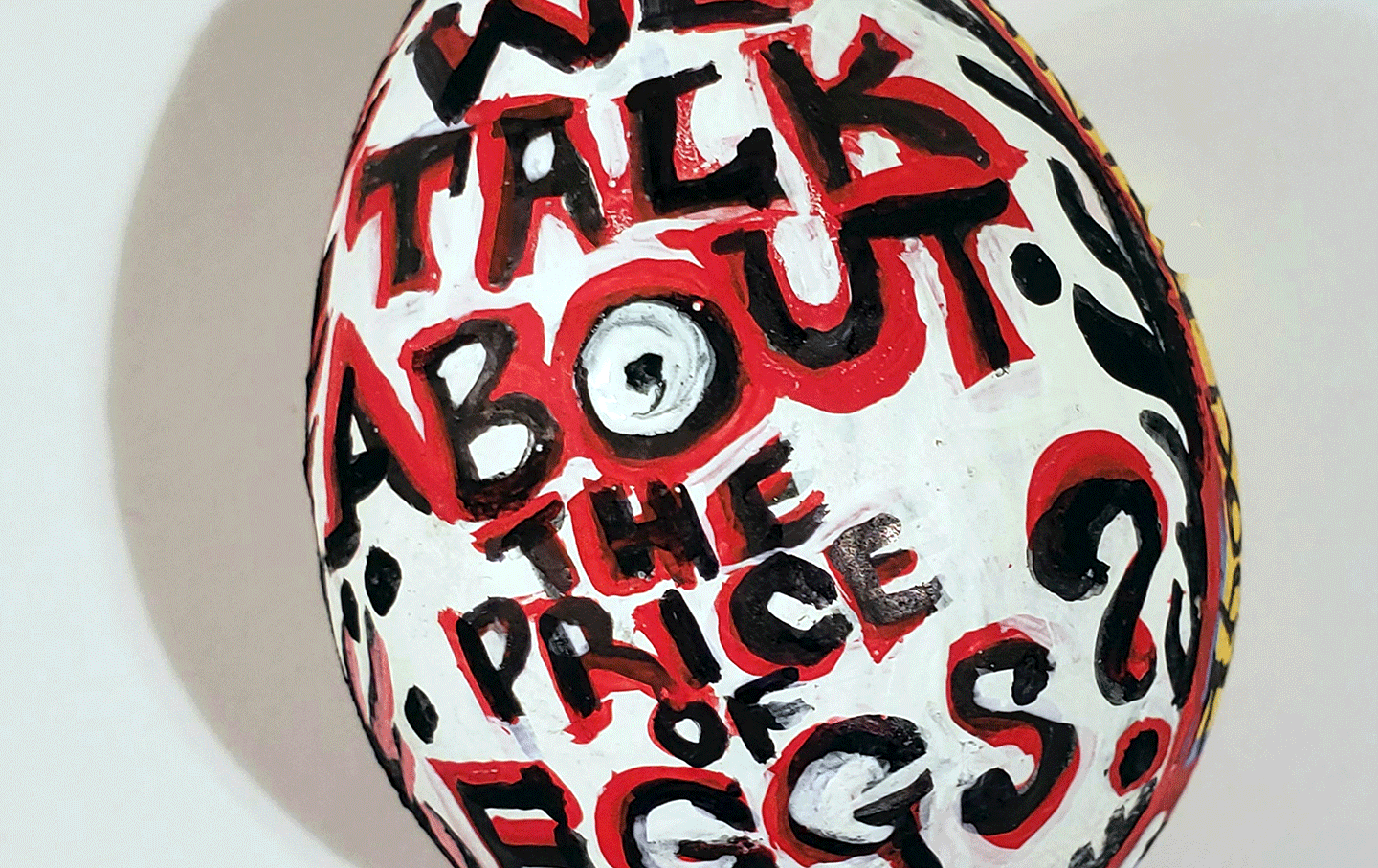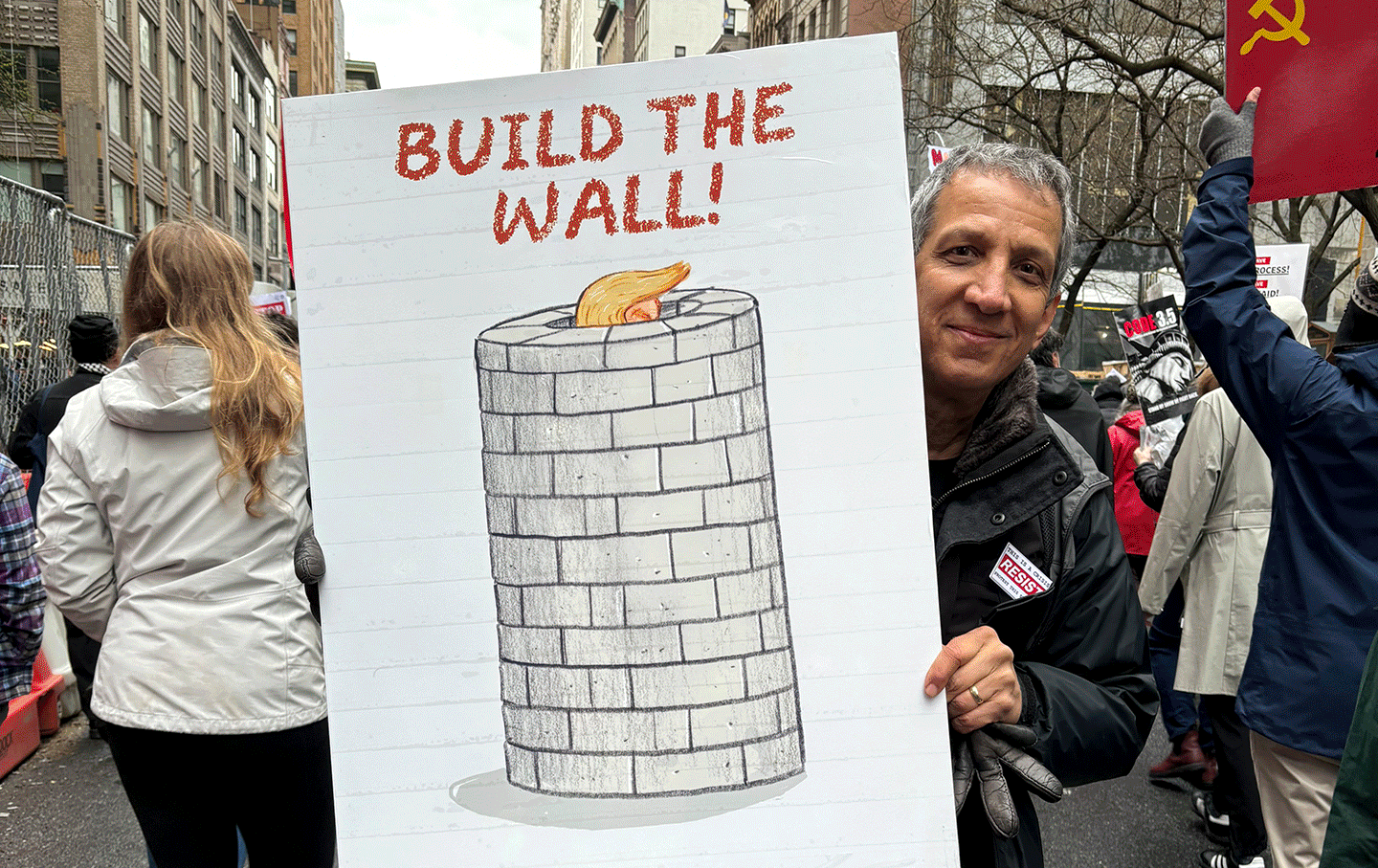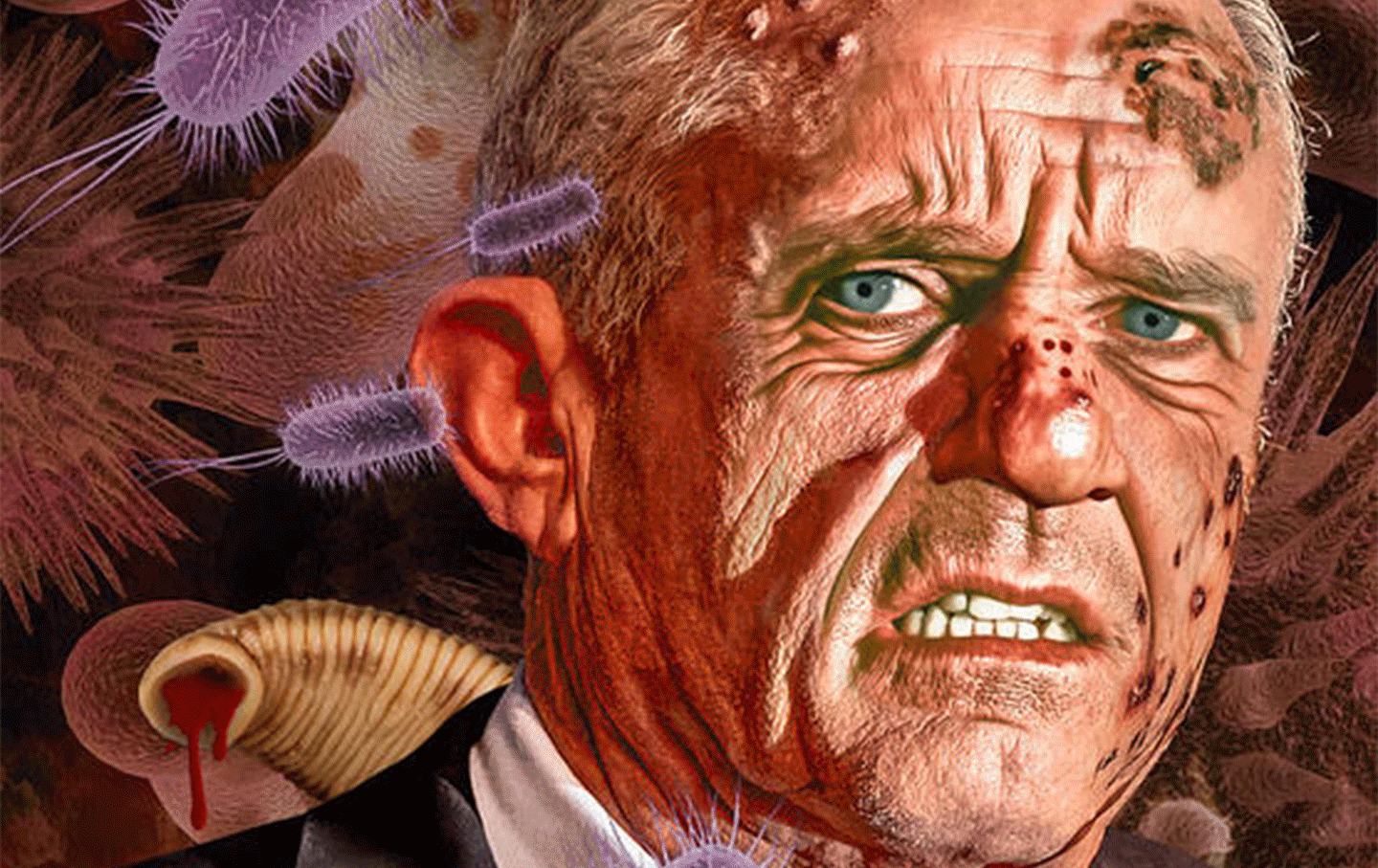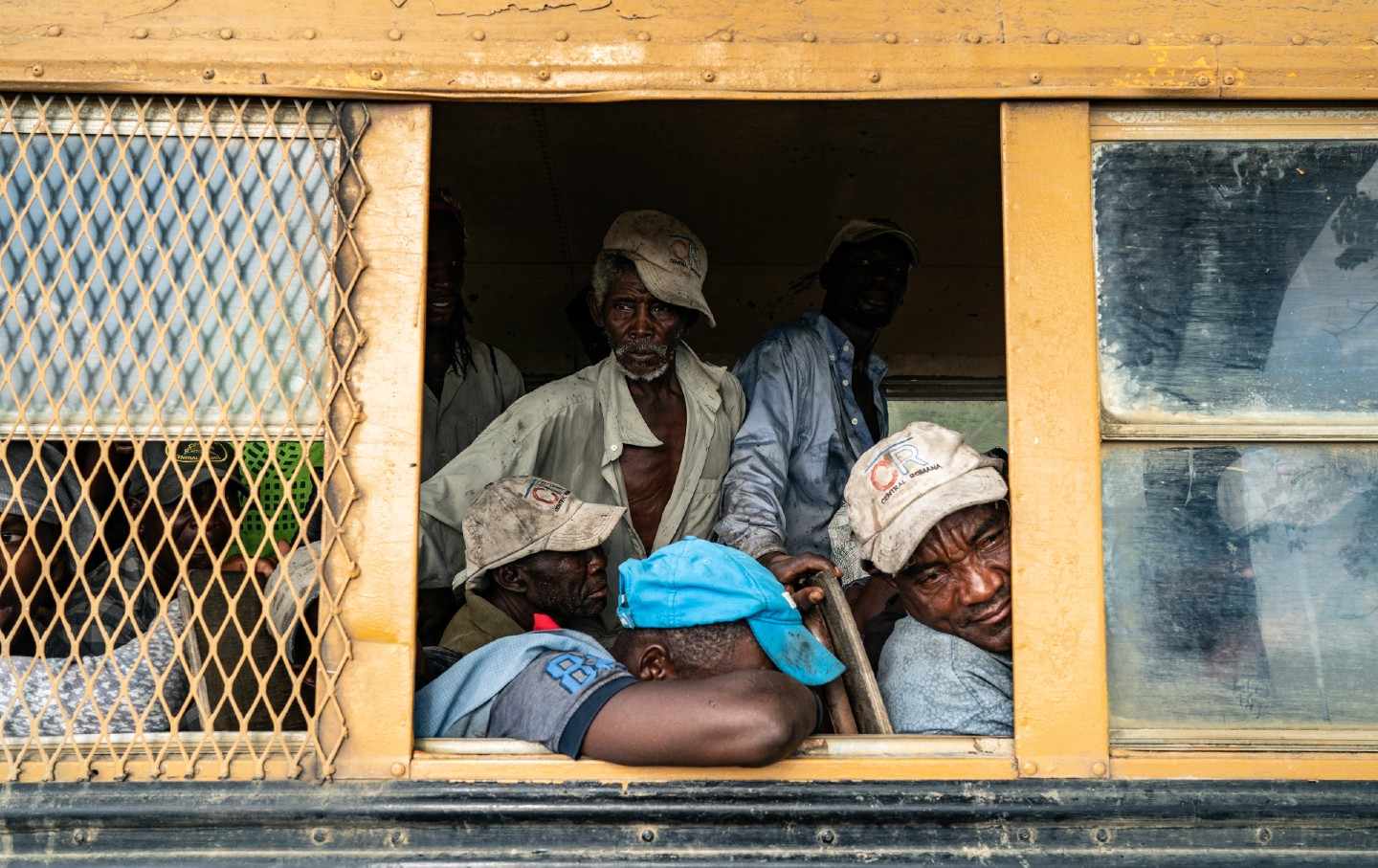“The Union Movement Is Very Excited About Harris and Walz”
In an exclusive interview with The Nation, AFSCME President Lee Saunders explains organized labor’s enthusiasm for the Democratic ticket.
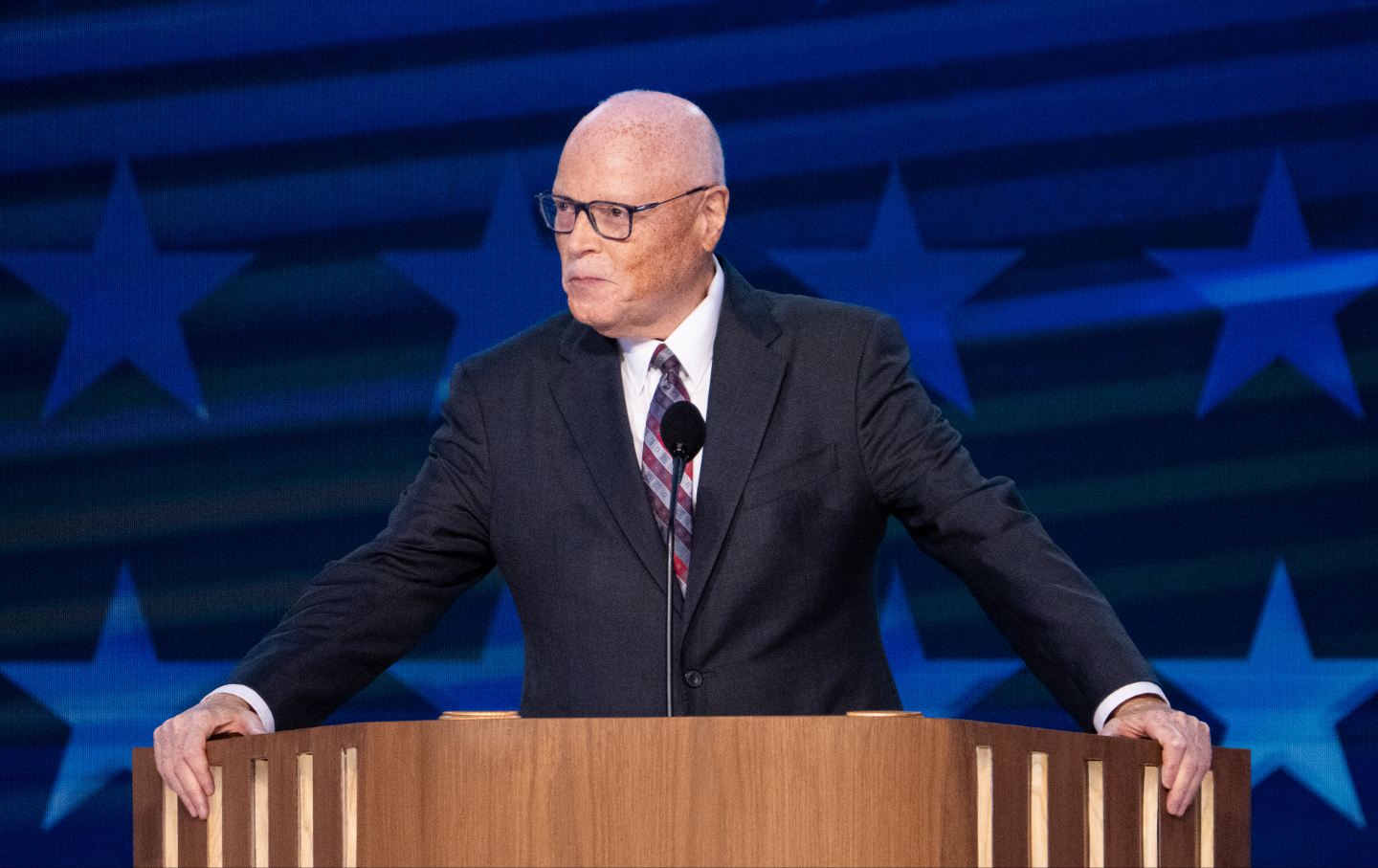
Lee Saunders, president of the American Federation of State, County, and Municipal Employees, speaks during the 2024 Democratic National Convention at the United Center in Chicago on Monday, August 19, 2024.
(Bill Clark / CQ-Roll Call, Inc via Getty Images)In his first solo appearance as the Democratic candidate for vice president of the United States, Tim Walz flew to Los Angeles to appear before 4,000 members of the American Federation of State, County and Municipal Employees (AFSCME), one of the most powerful and engaged labor unions in the United States. Walz, for many years a dues-paying member of two public-sector labor organizations, the National Education Association and the American Federation of Teachers, thanked the assembled delegates for “having a fellow union member” as their convention speaker and declared, with as much passion as a Minnesotan can muster, that “AFSCME stands for all that’s right.”
That wasn’t political small talk of the sort that candidates engage in when they are simply tapping the bases of constituent groups in their coalitions. That was a sincere expression of gratitude from a former member of Congress and a governor who has relied on the support of AFSCME—a 1.4 million-member union with a long history of identifying and supporting rising stars in the Democratic Party—to win his own elections, and to help him make Minnesota what Walz describes as “one of the best states for workers in the nation.”
Walz’s connection with AFSCME runs deep. Like Democratic presidential nominee Kamala Harris, he has high regard for the union’s president, Lee Saunders, who for many years has chaired the political committee of the AFL-CIO, served on the Democratic National Committee, and built a reputation as a uniquely savvy and influential political strategist and policy advocate. A working-class intellectual who trained as a labor economist but has always maintained the enthusiasm of a grassroots organizer, Saunders sees organized labor in the context of broader movements—he’s long been active with the Leadership Conference on Civil and Human Rights, a group he currently serves as treasurer—and progressive governance.
Recalling their history together, Walz said of Saunders, “We’ve done a few door knocks, we’ve done a few phone banks, we’ve done a few rallies, and we’ve worked together on a few laws to improve people’s lives.” Hailing the union president as “the friend to every American worker”—those who have organized as union members and those who have yet to organize—Walz said Saunders and AFSCME understand the basic premise of progressive trade unionism: “you don’t win elections to bank political capital to win another election; you take that political capital and you burn it as fast as you can to improve people’s lives.”
Presidential campaigns do not do many things by accident. The decision to have Walz start his solo campaigning with AFSCME sent a message that the Democratic ticket wants to maintain the tight relationship that the movement developed with Joe Biden, a labor favorite who liked to assert that he was the most pro-union president in modern American history.
In an exclusive Labor Day interview with The Nation, Saunders said that the Harris-Walz ticket had generated “a level of excitement that I haven’t seen for a long time.” He also expressed his confidence that Harris and Walz would pick up where Biden left off.
“We know her not only from being the vice president, but we know her from when she was attorney general in California—and the work she did with childcare and home care and the care economy,” Saunders recalled. “She was a partner with President Biden, when she served as vice president; and we have complete faith and trust in what she will do to move this country forward. By the same token, I have known, very well, Tim Walz as the governor of Minnesota. We have two very strong affiliates in that state. I go to that state very often, and I always see him and talk to him. There is no question in my mind that this is a team that will fight for working families. They will crisscross the country to do what they need to do to motivate people, to educate folks, to mobilize folks around the importance of this election. We’re very excited about it. Our members are very excited about it. The labor union movement, the trade union movement, is very excited about Harris and Walz.”
That excitement is evidenced in the backing the Democratic ticket has secured from the AFL-CIO and most of the high-profile unions that are associated with the federation. In addition to support from AFSCME—which has members organized across 3,400 local unions and 58 councils and affiliates in 46 states, the District of Columbia, and Puerto Rico—the Harris-Walz ticket has won endorsements from the Service Employees International Union, the American Federation of Teachers, the National Education Association, the Communications Workers of America, the United Steelworkers, the Laborers International Union of North America, the International Brotherhood of Electrical Workers, the International Union of Painters and Allied Trades, the International Union of Operating Engineers, National Nurses United, and dozens of other international unions, labor federations, and locals across the country. Vital support has also come from the United Auto Workers union, which is an especially influential force in the battleground states of Michigan, Wisconsin, and Pennsylvania.
The ticket is still working to secure the backing of two key unions, the International Brotherhood of Teamsters and the International Association of Fire Fighters. Walz made his pitch to the firefighters on Wednesday at their convention in Boston, saying to the cheering crowd, “Sisters and brothers in labor, it’s time for you to step up to the plate.”
The Democratic outreach to labor is more than a messaging exercise. It reflects the reality that unions are an essential base of political—and practical—support for the party. That was certainly the case in 2020, when Biden defeated Trump by 7 million votes nationally and retook three historic union states—Wisconsin, Michigan, and Pennsylvania—that had been narrowly carried by Trump in 2016. Biden has worked hard to maintain the relationship, regularly meeting with and taking the counsel of labor leaders, appointing labor allies to key positions, and advancing a pro-worker agenda even as he has faced very nearly uniform opposition from congressional Republicans and splits in the ranks of the Senate Democratic Caucus. And Harris has been at the president’s side every step of the way, said Saunders.
“She was a team player,” he said of the Biden-Harris partnership. “She was his vice president and she was instrumental in helping to move a lot of the important legislation—along with President Biden—that supported working families. You look at the relief plan, where she was the tie-breaking vote. You look at the infrastructure plan, where she was the tie-breaking vote. She was really a partner with President Biden, and we know for a fact that she is going to continue to support working families all across the country. Union people are excited about it. And, now, with Tim Walz, I think it’s a dynamic duo.”
For Saunders and his union, Biden and Harris’s election in 2020 was not just a political win. It represented a fundamental shift toward a more respectful approach to the public-sector workers that former President Donald Trump had so frequently derided—and that Trump had failed to adequately protect and support when the coronavirus pandemic hit the United States. Saunders described the frontline workers in the hospitals, public health, and public safety agencies that were the first responders to the crisis as “the everyday heroes who got us through Covid.”
“We had so many people that were overworked. They were fearful of being exposed to the virus, catching the virus. They were working with the lack of proper equipment,” recalled the union president. “In many cases, they risked their lives to continue to provide public services—because they were dedicated. We’ve just got to continue to remind people that we could not be the country that we are with a weak public service. We’ve got to have a strong public service in this country.”
That’s a faith that Saunders has embraced since he was a child growing up in Cleveland. “Public service is the foundation of our democracy. I have always believed that,” he said. “I come from a family that provided public services in Cleveland. My dad was a bus driver and he was a proud union member. He would always tell me, ‘Lee, if you have an opportunity to join the union at your workplace, you join that union and you be active.’ My mom was a community organizer. They understood that link, that role, that we have in making the foundation strong.”
Saunders followed his father’s advice and got active in trade unionism as a young man. He began working with AFSCME in the 1970s and spent decades in top positions with the union, including tenures as executive assistant to the president, administrator of the 125,000-member District Council 37—New York City’s largest public employee union—and international secretary-treasurer.
Saunders was elected AFSCME’s president in 2012, at a point when public employees and their unions were under fierce attack. Wisconsin Governor Scott Walker led the assault, but other Republican governors—including John Kasich in Ohio and Rick Snyder in Michigan—promoted laws that were specifically designed to undermine collective bargaining protections for state, county, and municipal workers, as well as teachers. In Wisconsin and Michigan, anti-union “right-to-work” laws were enacted, targeting both private- and public-sector labor organizations.
Walker was eventually defeated in 2018 by AFSCME-backed Democrat Tony Evers, while Snyder was replaced the same year in Michigan by another AFSCME-backed Democrat, Gretchen Whitmer. Now, in an increasing number of states, pro-labor Democrats have what’s referred to as “trifecta control,” which puts them in charge of the governorship and both houses of the state legislature.
Popular
“swipe left below to view more authors”Swipe →“Look at the states where we have a trifecta,” said Saunders. “Minnesota comes to mind. Where we have a pro-worker governor and a pro-worker legislature, we’ve been able to do some great things for workers, great things. And look at Michigan, where Gretchen Whitmer and the Democrats overturned a ‘right-to-work’ and established all these new protections for workers.”
Other states present tougher challenges. “That’s where they will continue to come at us, if we have the wrong folks that are in office,” explained Saunders. “That’s why it’s so important that we treat local elections with the same importance that we treat national elections—and maybe even lead with those elections to connect our members so that they understand the importance of all the elections.”
One of the labor movement’s deepest political thinkers, Saunders has long advocated for strategies that built from the grassroots toward statewide and national power. This Labor Day, as he looks toward the fall presidential race and the fight for control of the US Senate, the union leader sees an opportunity not just to defeat Trump and the anti-labor agenda of Republicans who have embraced the corporate-sponsored Project 2025 initiative but, just as significantly, to put in place an explicitly pro-union administration and a Congress that will secure passage of labor law reforms such as the Protecting the Right to Organize Act.
“This is an exciting time. You can feel the energy. You can feel the enthusiasm. This energizes all the races. It energizes not only the presidential race, it energizes the Senate, it energizes the House, it energizes state legislatures where we’re having elections across the country,” said Saunders. “Now, we have a job to do: That’s communicating: communicating with our members, communicating with our communities across the country, and making sure that they understand that there is a true difference between a ticket [led by Donald Trump and JD Vance] that wants to bury workers and not support working families versus a ticket of Kamala Harris and Tim Walz, who want to support working families who want to [finish the work of the Biden administration with a renewed push to] enact legislation that will support civil rights and worker rights and economic rights.”
Hold the powerful to account by supporting The Nation
The chaos and cruelty of the Trump administration reaches new lows each week.
Trump’s catastrophic “Liberation Day” has wreaked havoc on the world economy and set up yet another constitutional crisis at home. Plainclothes officers continue to abduct university students off the streets. So-called “enemy aliens” are flown abroad to a mega prison against the orders of the courts. And Signalgate promises to be the first of many incompetence scandals that expose the brutal violence at the core of the American empire.
At a time when elite universities, powerful law firms, and influential media outlets are capitulating to Trump’s intimidation, The Nation is more determined than ever before to hold the powerful to account.
In just the last month, we’ve published reporting on how Trump outsources his mass deportation agenda to other countries, exposed the administration’s appeal to obscure laws to carry out its repressive agenda, and amplified the voices of brave student activists targeted by universities.
We also continue to tell the stories of those who fight back against Trump and Musk, whether on the streets in growing protest movements, in town halls across the country, or in critical state elections—like Wisconsin’s recent state Supreme Court race—that provide a model for resisting Trumpism and prove that Musk can’t buy our democracy.
This is the journalism that matters in 2025. But we can’t do this without you. As a reader-supported publication, we rely on the support of generous donors. Please, help make our essential independent journalism possible with a donation today.
In solidarity,
The Editors
The Nation

